Some dietary factors can modulate the effect of the zinc transporters 8 polymorphism on the risk of metabolic syndrome
- PMID: 28490771
- PMCID: PMC5431973
- DOI: 10.1038/s41598-017-01762-9
Some dietary factors can modulate the effect of the zinc transporters 8 polymorphism on the risk of metabolic syndrome
Abstract
There are conflicting data on the impact of zinc transporter 8 (ZNT8) gene variations on the metabolic syndrome (MetS). Hence, the effects of the interaction between rs13266634 and dietary factors on the risk of MetS were investigated in this study. Subjects of this nested case-control study were selected from the participants in Tehran Lipid and Glucose Study. Each of the cases (n = 817) was individually matched with a control. Dietary patterns were determined using factor analysis. The ZNT8 rs13266634 were genotyped by the Tetra-refractory mutation system-polymerase chain reaction analysis. Two dietary patterns were extracted. There were no significant interactions between the ZNT8 SNP and the dietary patterns on the risk of MetS or its components. An interaction was observed between rs13266634 and the omega-3 fatty acid intakes on the risk of MetS in subjects with the CC genotype (P interaction < 0.01). Zinc modified the association of the ZNT8 variant with high fasting blood sugar (P interaction = 0.05) in CC genotype carriers. An interaction was also observed between rs13266634 and salty snacks at the risk of abdominal obesity (P interaction < 0.05). Our findings suggest an interaction between omega-3 fatty acids, zinc, salty snacks and rs13266634, which may affect the risk of MetS or its components.
Conflict of interest statement
The authors declare that they have no competing interests.
Figures
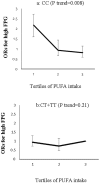
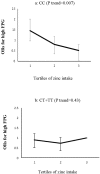
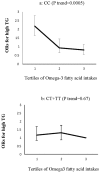
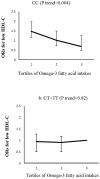
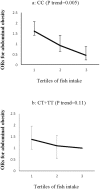
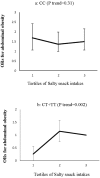
References
Publication types
MeSH terms
Substances
LinkOut - more resources
Full Text Sources
Other Literature Sources
Medical

